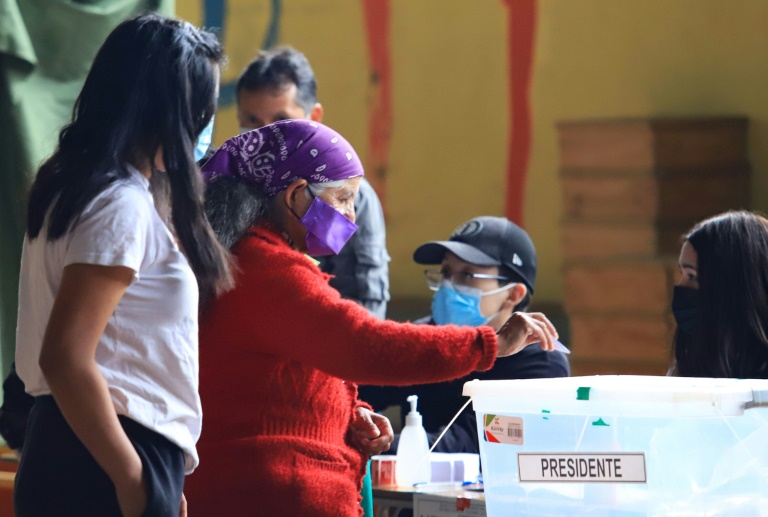Chile chooses Sunday between far-right and leftist candidates for a president to lead the country through a period of constitutional change amid a clamor for social reform.
The country of 19 million people is on edge, fearing renewed mass protests in response to the outcome of the neck-and-neck race between ultra-conservative lawyer Jose Antonio Kast, 55, and former student activist Gabriel Boric, a millennial 20 years Kast’s junior.
For a country that has voted centrist since the democratic ousting of brutal dictator Augusto Pinochet 31 years ago, there is a stark choice between two political outsiders, one promising a “social welfare” state, the other a continuation of Chile’s neo-liberal economic model.
Many fear the socially and fiscally conservative policies of law-and-order candidate Kast — an apologist for Pinochet, who is also anti-same-sex marriage and abortion and a proponent of cutting taxes and social spending.
Others are put off by Boric’s political alliance with the Communist Party, which many in Chile equate with the failure of Venezuela, from where it hosts many migrants widely blamed for a rise in crime.
Socially liberal Boric, who has taken up the mantle of Chile’s 2019 anti-inequality uprising, has vowed to increase social spending in a country with one of the world’s largest gaps between rich and poor.
– ‘Very nervous’ –
Polls opened at 8:00 am (1100 GMT) and after casting his ballot, Boric reiterated his plans for “a more humane Chile, a more dignified Chile, a more egalitarian Chile.”
Kast, for his part, emphasized the country needed “justice, order, security.”
Boric pledged to recognize the election’s outcome, unlike Kast who said he might seek a recount if the final margin is under 50,000 votes.
“We have hope, we believe that we will enter another stage in Chile, a stage where we can test the concept of the welfare state,” Boric-backer Sebastian Vera, a 35-year-old history teacher, told AFP on his way to the ballot box.
But if Kast wins, he said, “I am afraid of a setback… to a place where our neo-liberal system will become even tougher than it already is.”
Nataly Hidd, a 32-year-old civil servant, said she was “scared of what can happen to my country” after Sunday’s vote.
“There will be protests, one way or the other.”
Student Nicolas Julio, 21, said he too was scared.
“I don’t trust either of the two,” he said, adding he “panicked” over having to decide which candidate was “the lesser evil.”
Kast edged out six other candidates in the first presidential election round in November to take the top spot, with 27.9 percent of the vote.
Boric came second, with 25.8 percent.
Both candidates have softened their policy proposals in a bid to appeal to Chileans left without an obvious candidate when they split the centrist vote in the first round, leaving only the two antipodes.
– There will be ‘noise’ –
Chile has a high abstention rate, with about 50 percent of its 15 million eligible voters regularly giving the ballot box a wide berth.
The country is going through profound change after voting overwhelmingly last year in favor of drawing up a new constitution to replace the one enacted in the Pinochet years.
This was in response to an anti-inequality social uprising in 2019 that left dozens dead and prompted the government to call a referendum.
The drafting process, in the hands of a largely left-leaning body elected in May, must yield a constitution for approval next year, on the new president’s watch.
The campaign has been polarized, with much antagonistic messaging and misinformation offensives.
President Sebastian Pinera, who leaves office with a low approval rating, said Sunday the country was living in “an environment of excessive polarization, confrontation, disputes.”
After casting his vote, he urged citizens to do the same for the sake of a better Chile.
“I feel sometimes that the country is better than politics because I see… that the people have more capacity for dialogue, for agreement, for understanding than politics.”
Analyst Patricio Nava of New York University told AFP there is likely to be unrest, or at least unease, ahead.
“There is going to be some noise, be it in the stock markets” if Boric wins, “or in the streets,” if Kast prevails.
Whoever ends up victorious, governing will not be easy with a Congress split almost 50-50, requiring negotiation on every policy proposal and compromise.
Polls close at 6:00 pm (2100 GMT) and results are expected a few hours later.










